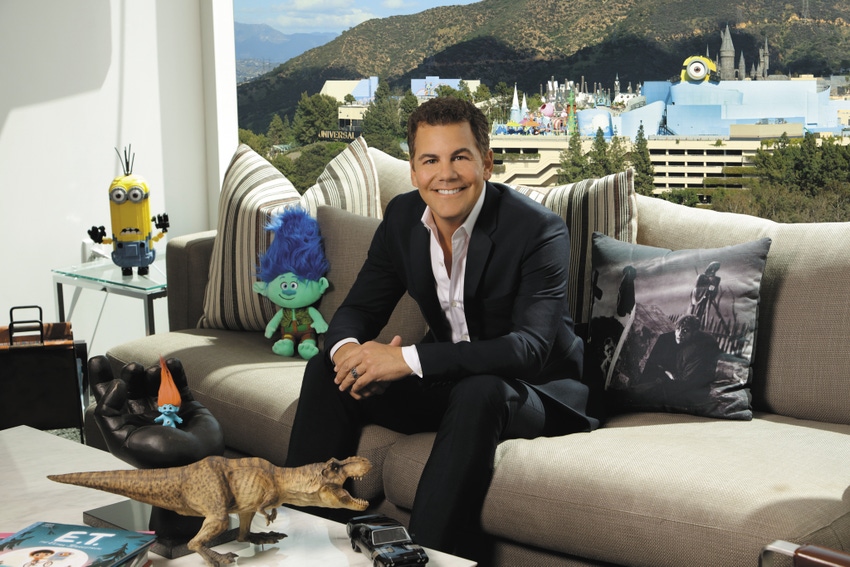What Makes Universal Unique? Vince Klaseus Goes Behind the Scenes
Universal Brand Development's Vince Klaseus has organized an infrastructure that builds global brands from a distinctly Universal point-of-view.

Universal Brand Development's Vince Klaseus is a busy man. As president, Klaseus is charged with overseeing Universal's ever-growing portfolio of brand-building divisions–consumer products, games and digital platforms and live events–a structure that has only come about in the past few years.
Klaseus joined parent company NBCUniversal in fall 2014 at a time when the studio's consumer products business was primed for an overhaul. To give his vast transformation some additional context, NBCUniversal came in at No. 34 on License Global's annual Top 150 Global Licensors report in 2014, with a reported $1.75 billion in retail sales of consumer products. Flash forward to 2018, and NBCUniversal, for which Universal Brand Development drives the revenue for the ranking, is No. 4, reporting $7.3 billion.
Walk into Universal, headquartered in North Hollywood, Calif., just in the shadow of the famed Universal Studios theme park, and you'll find a completely different organization than pre-Klaseus, with a scale and breadth that rivals any other world-class licensor. And now, thanks to some critical and strategic planning, the organization is perfectly positioned to cement its status as a veritable content powerhouse with sweeping demographic appeal, from young to old, in all corners of the world.
Klaseus joined Universal post-finalization of the major Comcast buyout in 2013, which gave the combined media monolith not only the entertainment people enjoy, but also the means to get it into their homes, and creating an organization that Comcast chief executive officer Brian Roberts then called "the ideal entertainment and distribution company," and marking the first time a traditional cable company effected full control of a content broadcast network.
Klaseus' pedigree prepared him for the undertaking. He began his career in 1995 at Mattel, later moving to The Walt Disney Studios for a dozen years, helping to launch iconic franchises such as Cars. Post Disney, Klaseus served as the chief executive officer of Cartwheel Kids.
So then, armed with a backing from the greater organization and up to the task, Klaseus walked through the doors of NBCU and shook up the foundation.
First things first, Klaseus changed the consumer products division's name from Universal Partnerships and Licensing, which relied on more traditional, promotionally-based business, to what it's known as today–Universal Brand Development. It's a move that is important as it set the tone for what Klaseus envisioned for the future.
"One of the very first things I did was change the name to reinforce the change of mission and what we were trying to do at the end of the day," says Klaseus. "At Universal Brand Development, we identify the IP and help build brands from the wider company and translate it into franchises. The change has been pretty dramatic and unprecedented in terms of where we were and where we are today. I can't think of another entertainment company that has gone through this kind of transformation in such a short period of time."
So brick-by-brick, Klaseus and his team embarked on the construction of a new organization, rebuilt from the ground, up, completely renovating the new venture from floor to ceiling, systems to infrastructure.
But Klaseus needed a solid foundation, and identified the need to establish a franchise management team, something he says had not existed in the film company's 100-plus years.
"I needed a team and a process in place that would take Universal's IP and strategically build it out across the company–as well as outside the company–and transform it into a brand, whether it's an event or the isolated medium of television," he says. "We took a uniquely Universal approach. The franchise management team is straddled between the Universal Brand Development group and the film group, and takes an approach that is collaborative and coordinated between key divisions that have a touchpoint in the brand to create a narrative that supports and builds an integrated approach for expansion."
David O'Connor was tapped to lead that piece, and serves as executive vice president, franchise management and brand strategy.
Klaseus also needed to establish a formalized consumer products group, and set a precedent for how business, and subsequently new revenue streams, would build for the future.
"The consumer products program was and remains one of the biggest opportunities for the company," says Klaseus. "What we did was create a virtual consumer products company. And I say 'virtual' because although we don't directly manufacture, we built all of the disciplines–the retail organization, the category organization and a robust product development organization with experts from the industry, disciplines and brands–and then tasked them to work hand-in-hand with Universal partners. It's really and truly a collaborative effort. It's taking the passive experience out."
In North America, Joe Lawandus is charged with overseeing the consumer products business as senior vice president and general manager.
The Universal consumer products group creates multi-category products that span toys and hard lines, fashion, homewares, food, health and beauty, stationery and publishing.
But being as Universal properties have global, and therefore widespread, appeal, the international component quickly became critical. Phase two, then? Open up new territory offices.
Boots on the ground are very much in the DNA of the new Universal, and offices in all major territories, from China to EMEA and Latin America, were and are essential. And so, in 2015, Klaseus opened the first dedicated Universal office in China, which he says had absolutely "zero volume" on day one but now is a significant driver of revenue with huge growth potential ahead of it. Today, Universal has 14 offices covering 22 countries, with strong agent partnerships around the world.
"The international piece is very interesting and will continue to be a growth opportunity for us," says Klaseus. "As much ground as we've covered already, there remains a lot of opportunity out there for us. As the initial offices mature and capabilities increase, we'll continue to expand and dive into the international specifics–we see a huge runway."
The first wave of Universal offices opened in Japan, Benelux and the G5, with the rest opening over the last 12 months.
Marc Low, senior vice president and general manager, has been tasked with overseeing consumer products internationally.
"Our global consumer products business unit has grown exponentially over the last two years, both in the U.S. and international territories. As we continue to expand our business both creatively and categorically, both Joe and Marc have the proven ability to amplify both our businesses and partner relationships as we set new benchmarks for the future," said Klaseus at the time of both Lawandus and Low's appointments.
And then it was time to work on the meat and potatoes, so to speak, and focus on building content engines that fuel the heart of Universal. Enter phase three... build a strong kids and family business filled with evergreen and new properties.
This began with the partnership and collaboration with Illumination Entertainment for the release of Despicable Me in 2010, and then in 2016 Universal bought DreamWorks Animation, a critical move, says Klaseus, for the entertainment studio's total portfolio of business.
"The DreamWorks acquisition was a strategic move because Universal's business is a family business, and what we needed was more IP and more content engines," he says. "What came out of that particular acquisition was an additional content creation studio and a TV engine for kids–two incredible sources for us."
Today, NBCU's DreamWorks is one of the world's largest producers of children's animated television series, as well as the owner of a vast vault of classic properties that span everything from entertainment to publishing including Casper the Friendly Ghost, "Noddy," Pat the Bunny, Where's Waldo?, "Voltron," "VeggieTales," "Lassie," Little Golden Books and so much more.
"DreamWorks has 20 series in production–the output and quality is mind-boggling," says Klaseus. "What DreamWorks unlocks is new IP and also gives us a sustaining vehicle to keep the bigger franchises alive."
Feature animation will continue to play a huge role in the Universal business development plan as it taps into the ramp up in production the studio has slated.
Beginning in 2020, NBCUniversal will consistently develop three to four animated films per year.
"2020 will be a big leap for us when we ramp up dramatically," says Klaseus. "That starts mapping out another big growth trajectory going forward."
Upcoming animated films on deck from Illumination include The Grinch, out this holiday season; The Secret Life of Pets 2, due next year; and Minions 2 and Sing 2, both out in 2020. DreamWorks releases include How to Train Your Dragon 3 for spring 2019, and Trolls returns in 2020 with a sequel.
"The mission is to build a larger kids and family business, which is also part of the larger company's mission as a whole," says Klaseus. "And a part of that is to build these big, global franchises. All hands are on deck and leaning into that. You'll start seeing it take shape from the various content pieces that roll out, as well as coordination within the company among its different units."
With this ramped up production schedule and with a sophisticated global organization to support, also comes a more refined approach to products, particularly for Illumination's Minions 2, says Klaseus.
"For Minions, we'll lean into the fashion-forward, trend-driven elements of the brand to deliver products or experiences," he says. "We're refining our approach."
But Universal is not limited to just kids and family entertainment. Scripted and non-scripted television, films and horror, as well as the deep Universal Vault (known colloquially as the U-Vault) offer a huge portfolio of properties to exploit.
From "American Ninja Warrior" and "Battlestar Galactica" in the adult TV space to DreamWorksTV kids' series like "Troll Hunters" and "Spirit," heritage films like E.T. and Back to the Future in the U-Vault and content under the Universal Pictures, Amblin Entertainment and Classic Media banner, the opportunities for brand development are seemingly endless.
An interesting opportunity, says Klaseus, is horror, which Universal can tap into for products and brand development under its partnership with Blumhouse, a production house hyper-focused on micro-budget films such as the Paranormal Activity and The Purge franchises.
As part of building a more modern, forward-thinking business, Klaseus says digital and data is a big investment for Universal now and into the future, and one where internal resources are heavily being allocated.
"It's such a fragmented market out there that you have to look at the world differently," says Klaseus. "There's not a silver bullet anymore. This omni-platform approach is where you need to be. We'll continue to invest our internal resources into places like our own DreamWorksTV on YouTube, Games Network or in our robust partnerships with companies like Netflix, Amazon and Walmart.com.
"You have to be everywhere where that customer wants you to be or expects you to be," continues Klaseus. "It's getting increasingly more complicated. Oftentimes, it requires a different product set or content set, as well as marketing, which is also more investment. It's hyper-localization at its best. You have to have the sophistication internally, the right resources and the right people to make that map for the future."
The upping of sophistication is a thread that runs throughout everything Klaseus is doing to take the Universal business to the next level, including its gaming component, or phase four.
Last year, Universal announced it was strategically focusing on gaming and building an internal organization with the capabilities to self-publish its own mobile titles, giving the company a more direct role in the creative, development, marketing and distribution of games based on its wealth of IP. Chris Heatherly, executive vice president, games and digital platforms, was tapped to oversee the sub-division, Universal Games.
"We have moved rapidly into building up those capabilities right now, hiring, on-boarding, building up systems, all of the things that come with that business, which is a unique animal in its own right," says Klaseus.
A year on, and the company's efforts are yielding results as gaming titles begin to roll out largely tied to the upcoming Jurassic World: Fallen Kingdom film launch, hitting theaters next month. The first title to debut under this new strategical focus is a location-based mobile game, titled "Jurassic World Alive," which also capitalizes on augmented reality technology. "Jurassic World Evolution," a licensed console game available for PC, PlayStation 4 and Xbox One with narration from actor Jeff Goldblum, is also set to debut. More announcements are to come for mobile titles in particular.
Universal is also taking an active role in moving the gaming industry forward and innovating in the space. At the Game Developers Conference, which took place in March in San Francisco, Universal Games, in partnership with Unity Technologies, announced the Universal GameDev Challenge, sponsored by Intel and Microsoft. The challenge invited developers from around the world to submit game designs and pitches based on Universal IP for a chance to win a $250,000 cash prize and the opportunity to be published.
"This is a great example of how we're trying to think differently about this business," says Klaseus. "We want to innovate and be first to market because the world is changing so rapidly, and you have to. You can't follow suit. The old model of pulling the pages out of what we have done in the past is not going to work. We're really trying to be, internally and externally, a partner and a model that is willing to take risks and do things differently."
The last step Klaseus and Universal has taken to transform and round out the world-class organization is to fully-form a live events group, led by Carol Nygren.
Through immersive experiences, the live entertainment component of Universal focuses on creating experiential extensions around NBCU IP. Pairing with best-in-class partners, the group produces exclusive touring entertainment.
Klaseus says the live entertainment group's offerings will start to roll out next year, first with the "Jurassic World Live" arena tour, in partnership with Feld Entertainment. "Jurassic World Live" will bring a herd of life-size dinosaurs–some up to 40-feet long–to the stage in a production that will kick off in fall 2019 in the U.S. and later tour around the world.
"Experiences is a movement that families and young adults are looking for. For us, it's a great touchpoint and engagement vehicle, and of course a new revenue stream," says Klaseus.
For Klaseus and Universal, growth has come at a dizzying and sometimes frenetic pace, but it's one that is thoughtful all the while and on par with the greater organizations goal–to bring quality entertainment into the lives and homes of its fans.
"The drum that we have been beating since we walked in the door is that we are creating a best-in-class organization," says Klaseus. "The company has some wonderful attributes to draw on such as integrity, collaboration and creativity–we've pulled and drawn on that hard to distill down how we've built this team.
"There is a lens that we look through that speaks to that and reiterates why we specifically called our group Universal Brand Development... it is because we feel that products and experiences truly are great touchpoints and engagement vehicles," he continues. "They're great revenue drivers and robust businesses unto themselves, as well, but at the end of the day they help build and expand powerful brands."
About the Author(s)
You May Also Like








